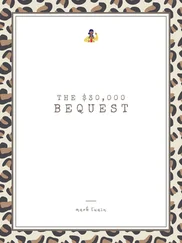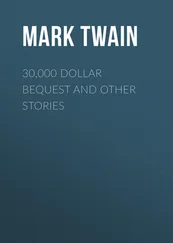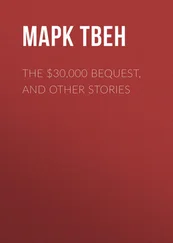Mark Twain - The 30,000 Dollar Bequest and Other Stories
Здесь есть возможность читать онлайн «Mark Twain - The 30,000 Dollar Bequest and Other Stories» весь текст электронной книги совершенно бесплатно (целиком полную версию без сокращений). В некоторых случаях можно слушать аудио, скачать через торрент в формате fb2 и присутствует краткое содержание. Год выпуска: 2004, Жанр: Классическая проза, на английском языке. Описание произведения, (предисловие) а так же отзывы посетителей доступны на портале библиотеки ЛибКат.
- Название:The 30,000 Dollar Bequest and Other Stories
- Автор:
- Жанр:
- Год:2004
- ISBN:нет данных
- Рейтинг книги:4 / 5. Голосов: 1
-
Избранное:Добавить в избранное
- Отзывы:
-
Ваша оценка:
- 80
- 1
- 2
- 3
- 4
- 5
The 30,000 Dollar Bequest and Other Stories: краткое содержание, описание и аннотация
Предлагаем к чтению аннотацию, описание, краткое содержание или предисловие (зависит от того, что написал сам автор книги «The 30,000 Dollar Bequest and Other Stories»). Если вы не нашли необходимую информацию о книге — напишите в комментариях, мы постараемся отыскать её.
The 30,000 Dollar Bequest and Other Stories — читать онлайн бесплатно полную книгу (весь текст) целиком
Ниже представлен текст книги, разбитый по страницам. Система сохранения места последней прочитанной страницы, позволяет с удобством читать онлайн бесплатно книгу «The 30,000 Dollar Bequest and Other Stories», без необходимости каждый раз заново искать на чём Вы остановились. Поставьте закладку, и сможете в любой момент перейти на страницу, на которой закончили чтение.
Интервал:
Закладка:
But if his falsehoods are distressing, his innocence and his ignorance are enough to make one burn the book and despise the author. In one place he was so appalled at the sudden spectacle of a murdered man, unveiled by the moonlight, that he jumped out of the window, going through sash and all, and then remarks with the most childlike simplicity that he "was not scared, but was considerably agitated." It puts us out of patience to note that the simpleton is densely unconscious that Lucrezia Borgia ever existed off the stage. He is vulgarly ignorant of all foreign languages, but is frank enough to criticize, the Italians' use of their own tongue. He says they spell the name of their great painter "Vinci, but pronounce it Vinchy"—and then adds with a naivete possible only to helpless ignorance, "foreigners always spell better than they pronounce." In another place he commits the bald absurdity of putting the phrase "tare an ouns" into an Italian's mouth. In Rome he unhesitatingly believes the legend that St. Philip Neri's heart was so inflamed with divine love that it burst his ribs—believes it wholly because an author with a learned list of university degrees strung after his name endorses it—"otherwise," says this gentle idiot, "I should have felt a curiosity to know what Philip had for dinner." Our author makes a long, fatiguing journey to the Grotto del Cane on purpose to test its poisoning powers on a dog—got elaborately ready for the experiment, and then discovered that he had no dog. A wiser person would have kept such a thing discreetly to himself, but with this harmless creature everything comes out. He hurts his foot in a rut two thousand years old in exhumed Pompeii, and presently, when staring at one of the cinder-like corpses unearthed in the next square, conceives the idea that maybe it is the remains of the ancient Street Commissioner, and straightway his horror softens down to a sort of chirpy contentment with the condition of things. In Damascus he visits the well of Ananias, three thousand years old, and is as surprised and delighted as a child to find that the water is "as pure and fresh as if the well had been dug yesterday." In the Holy Land he gags desperately at the hard Arabic and Hebrew Biblical names, and finally concludes to call them Baldwinsville, Williamsburgh, and so on, "for convenience of spelling."
We have thus spoken freely of this man's stupefying simplicity and innocence, but we cannot deal similarly with his colossal ignorance. We do not know where to begin. And if we knew where to begin, we certainly would not know where to leave off. We will give one specimen, and one only. He did not know, until he got to Rome, that Michael Angelo was dead! And then, instead of crawling away and hiding his shameful ignorance somewhere, he proceeds to express a pious, grateful sort of satisfaction that he is gone and out of his troubles!
No, the reader may seek out the author's exhibition of his uncultivation for himself. The book is absolutely dangerous, considering the magnitude and variety of its misstatements, and the convincing confidence with which they are made. And yet it is a text-book in the schools of America.
The poor blunderer mouses among the sublime creations of the Old Masters, trying to acquire the elegant proficiency in art-knowledge, which he has a groping sort of comprehension is a proper thing for a traveled man to be able to display. But what is the manner of his study? And what is the progress he achieves? To what extent does he familiarize himself with the great pictures of Italy, and what degree of appreciation does he arrive at? Read:
"When we see a monk going about with a lion and looking up into heaven, we know that that is St. Mark. When we see a monk with a book and a pen, looking tranquilly up to heaven, trying to think of a word, we know that that is St. Matthew. When we see a monk sitting on a rock, looking tranquilly up to heaven, with a human skull beside him, and without other baggage, we know that that is St. Jerome. Because we know that he always went flying light in the matter of baggage. When we see other monks looking tranquilly up to heaven, but having no trade-mark, we always ask who those parties are. We do this because we humbly wish to learn."
He then enumerates the thousands and thousand of copies of these several pictures which he has seen, and adds with accustomed simplicity that he feels encouraged to believe that when he has seen "Some More" of each, and had a larger experience, he will eventually "begin to take an absorbing interest in them"—the vulgar boor.
That we have shown this to be a remarkable book, we think no one will deny. That is a pernicious book to place in the hands of the confiding and uniformed, we think we have also shown. That the book is a deliberate and wicked creation of a diseased mind, is apparent upon every page. Having placed our judgment thus upon record, let us close with what charity we can, by remarking that even in this volume there is some good to be found; for whenever the author talks of his own country and lets Europe alone, he never fails to make himself interesting, and not only interesting but instructive. No one can read without benefit his occasional chapters and paragraphs, about life in the gold and silver mines of California and Nevada; about the Indians of the plains and deserts of the West, and their cannibalism; about the raising of vegetables in kegs of gunpowder by the aid of two or three teaspoons of guano; about the moving of small arms from place to place at night in wheelbarrows to avoid taxes; and about a sort of cows and mules in the Humboldt mines, that climb down chimneys and disturb the people at night. These matters are not only new, but are well worth knowing. It is a pity the author did not put in more of the same kind. His book is well written and is exceedingly entertaining, and so it just barely escaped being quite valuable also.
(One month later)
Latterly I have received several letters, and see a number of newspaper paragraphs, all upon a certain subject, and all of about the same tenor. I here give honest specimens. One is from a New York paper, one is from a letter from an old friend, and one is from a letter from a New York publisher who is a stranger to me. I humbly endeavor to make these bits toothsome with the remark that the article they are praising (which appeared in the December GALAXY, and PRETENDED to be a criticism from the London SATURDAY REVIEW on my INNOCENTS ABROAD) WAS WRITTEN BY MYSELF, EVERY LINE OF IT:
The HERALD says the richest thing out is the "serious critique" in the London SATURDAY REVIEW, on Mark Twain's INNOCENTS ABROAD. We thought before we read it that it must be "serious," as everybody said so, and were even ready to shed a few tears; but since perusing it, we are bound to confess that next to Mark Twain's "Jumping Frog" it's the finest bit of humor and sarcasm that we've come across in many a day.
(I do not get a compliment like that every day.)
I used to think that your writings were pretty good, but after reading the criticism in THE GALAXY from the LONDON REVIEW, have discovered what an ass I must have been. If suggestions are in order, mine is, that you put that article in your next edition of the INNOCENTS, as an extra chapter, if you are not afraid to put your own humor in competition with it. It is as rich a thing as I ever read.
(Which is strong commendation from a book publisher.)
The London Reviewer, my friend, is not the stupid, "serious" creature he pretends to be, I think; but, on the contrary, has a keep appreciation and enjoyment of your book. As I read his article in THE GALAXY, I could imagine him giving vent to many a hearty laugh. But he is writing for Catholics and Established Church people, and high-toned, antiquated, conservative gentility, whom it is a delight to him to help you shock, while he pretends to shake his head with owlish density. He is a magnificent humorist himself.
Читать дальшеИнтервал:
Закладка:
Похожие книги на «The 30,000 Dollar Bequest and Other Stories»
Представляем Вашему вниманию похожие книги на «The 30,000 Dollar Bequest and Other Stories» списком для выбора. Мы отобрали схожую по названию и смыслу литературу в надежде предоставить читателям больше вариантов отыскать новые, интересные, ещё непрочитанные произведения.
Обсуждение, отзывы о книге «The 30,000 Dollar Bequest and Other Stories» и просто собственные мнения читателей. Оставьте ваши комментарии, напишите, что Вы думаете о произведении, его смысле или главных героях. Укажите что конкретно понравилось, а что нет, и почему Вы так считаете.












